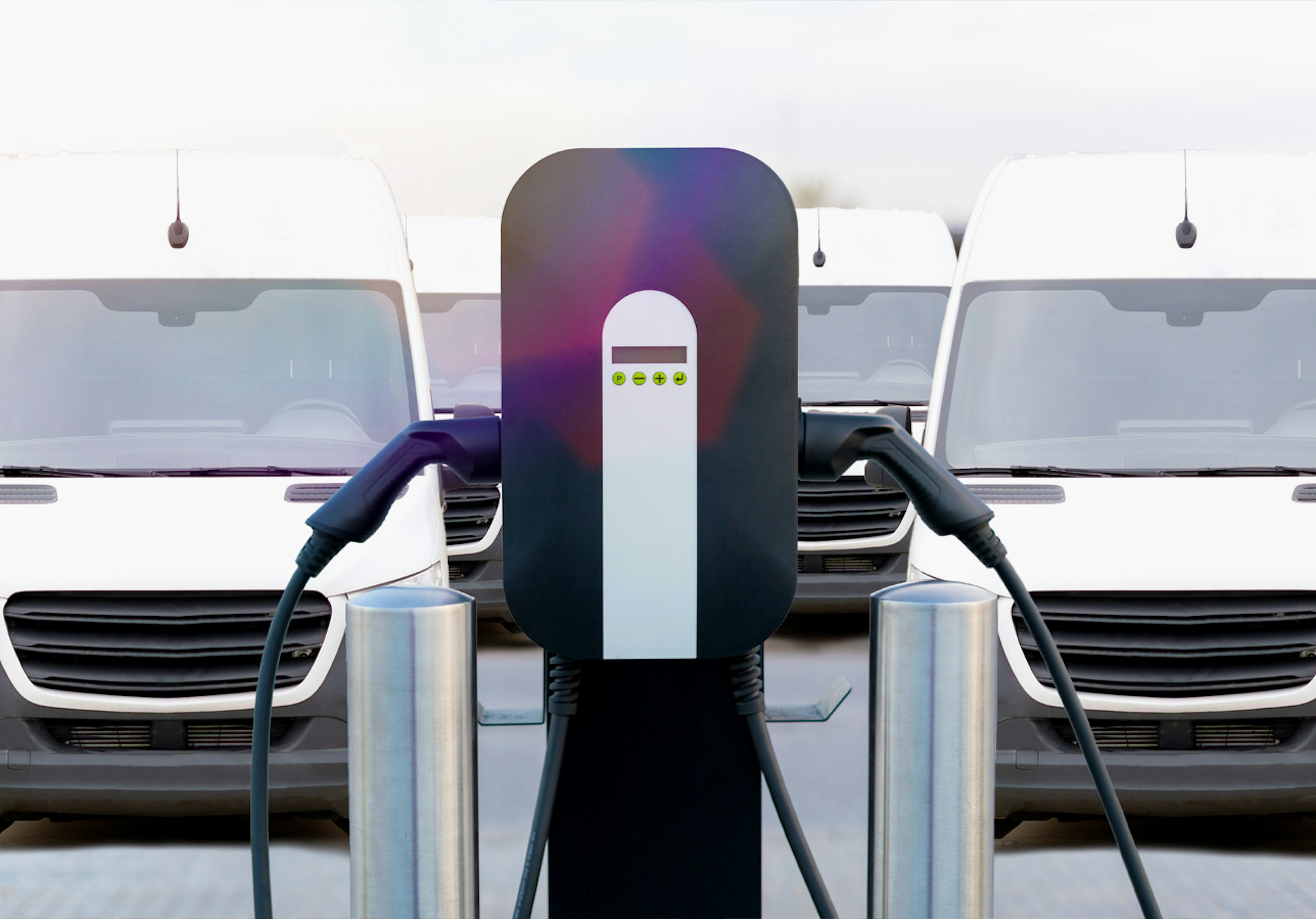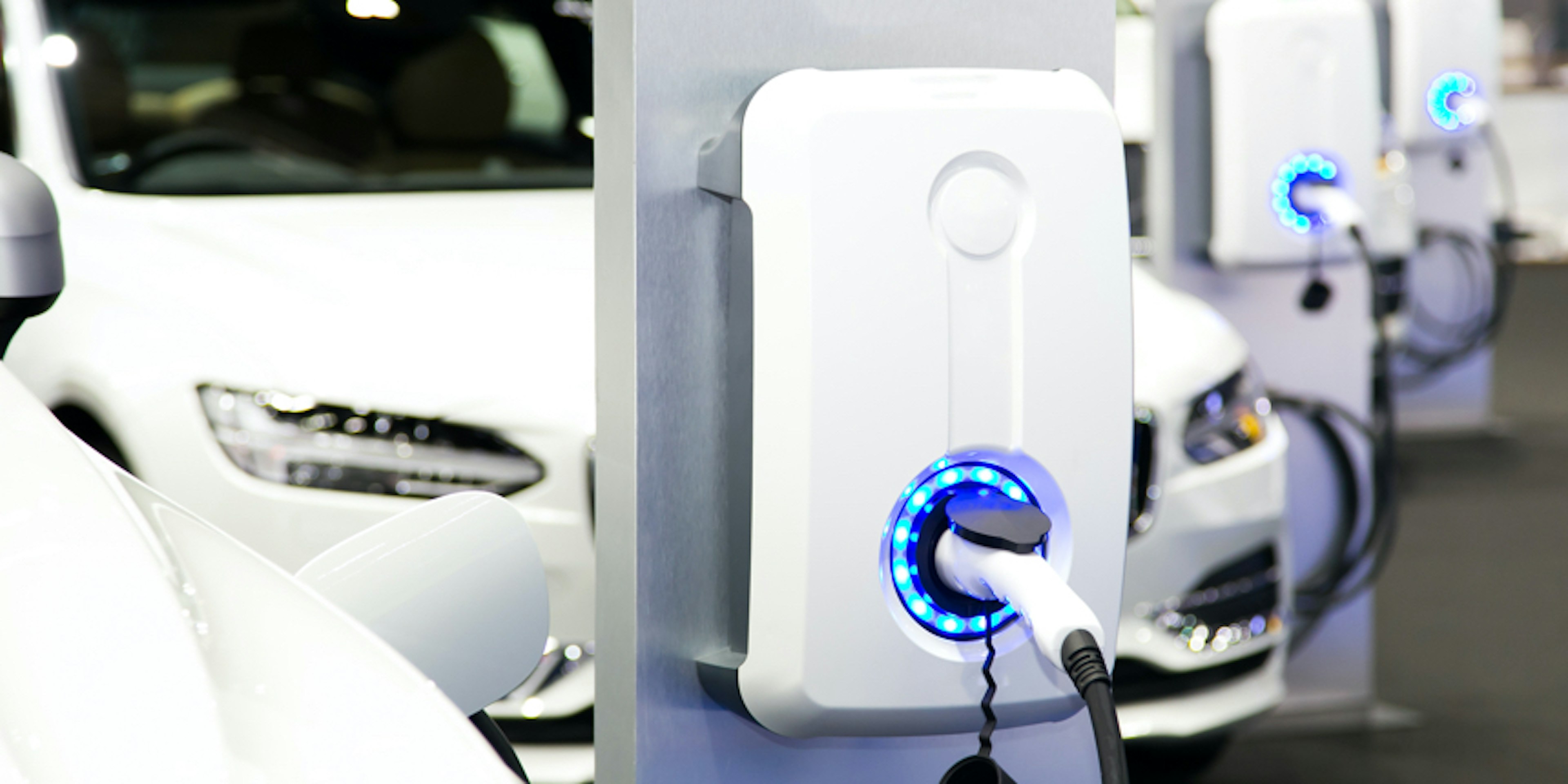When people think of electric vehicles (EVs), the tiny models that squeeze into compact parking spots are often the first to come to mind. But over the last decade, EVs have started taking on all shapes and sizes for contracting, landscaping, and delivery duties—and as auto companies find more innovative ways to fix the issues that come with electrifying heavy-duty trucks, fleet managers may want to think twice before turning a blind eye to EVs. After all, when it comes to making the switch from gas to electric trucks for your fleet, it’s not a matter of if—it’s a matter of when.
Many forward-thinking companies have already started electrifying fleets of large vehicles. New York City plans to convert its public bus system, the Metropolitan Transportation Authority, to an all-electric fleet by 2040. Amazon is already using EVs in its delivery fleet, and plans to bring 100,000 electric delivery vehicles on the road by 2030. In December 2019, Tesla unveiled the Cybertruck, an all-electric pickup truck with the performance specs of a sports car, and deliveries slated to begin in 2024. But adding electric trucks to your fleet is no simple task, and it probably won’t be on most fleet managers’ radar until we see more of them on the road. Admittedly, it has taken a long time to electrify heavier-duty vehicles, for reasons ranging from the additional weight in cargo beds affecting battery power to the need for more EV charging stations across the country.
Fortunately, more automakers have proven that they’re up for the challenge. Ford, Rivian, GM, and Canoo are just a few of the automakers releasing electric pickup and commercial trucks to the market. Plus, the EV movement as a whole is gaining more momentum, with the U.S. investing billions to create high-paying jobs and build new EV manufacturing plants. Electric trucks will likely become commonplace in the next decade, so there’s never been a better time to start thinking about adding them to your fleet.
Pros of powering up
Save money through EV tax credits
When debating the merits of electric vs. gas, EV tax credits are a big factor in getting people to switch. Under EPA rules, new medium and heavy-duty vehicles and engines must adhere to rigid carbon dioxide emissions limits that will continue to affect model years 2027-2032. So, by selling even small volumes of electric trucks, the original equipment manufacturers can bring down their carbon emission numbers while getting EV tax credits for over-complying to standards. Fleet managers who add EVs to their fleet are eligible for rebates, vehicle registration fee reductions, loans, and special low-cost charging rates. For a detailed list of tax credits and incentives by area, visit the U.S. Department of Energy's Alternative Fuels Data Center.
Cut fuel and maintenance costs
EVs are four times more efficient than internal combustion engines, which ultimately means hefty savings on fuel. Further, EVs have fewer and less complex equipment needs. There’s no need for oil changes or spark plugs, which means less time and money spent on maintenance. And since electric motors can slow themselves down, you’ll also put less strain on your brakes.
Charge toward the future
Policy changes are on the rise at the state level; as of July 2021, at least 47 states and the District of Columbia offer incentives to encourage deployment of EVs or alternative fuel vehicles and the development of the necessary infrastructure. Fleet managers can expect these changes to accelerate and transform the EV landscape. California, for instance, surpassed its zero-emission vehicle truck sales goal two years ahead of schedule. Meanwhile, the U.K. is introducing a ban on petrol and diesel cars in 2035. If your fleet wants a head start, it's time to think EV.
Fuel for thought: Cons to electrifying
Higher up-front cost
New technology is bound to be pricey. The 2023 Rivian R1T, an all-electric pickup truck, starts at $73,000. More affordable, though still a substantial investment, the Ford F-150 Lighting starts at $49,995. Depending on the EV you choose, federal and state purchase incentives can have a meaningful impact on the price.
Adoption is still foreign
The burly stereotypes of pickup truck owners simply don’t fit into the demographics of current EV owners. It will take considerable convincing to sell brand-loyal truck owners on the benefits of switching to an electric truck. On Tesla’s Cybertruck, one analyst noted that the flashy electric truck misses the mark on core truck buyers—a contractor is “not going to show up to a work site in this truck.” With so much cost-saving potential, companies may need to be strategic about how they’re branding electric trucks to alter current perceptions.
Distance and elements cause trouble
Most combustion-powered vehicles offer fuel ranges of 300-450 miles per tank. In 2021, the average EV offered a range of 234 miles; today, that number sits right below 300. While that is an improvement, it might not be enough to eliminate drivers’ range anxiety—and how fast you’re going can impact that range. EVs use more energy at higher speeds, and it’s recommended that EV drivers keep their speed under 60 mph to maintain battery life. This means combustion trucks may be a more efficient choice for lengthy freeway trips—especially if your electric commercial truck is loaded up with cargo. And that doesn’t even take weather into account. EVs don’t generally do well in the cold. Using your heating system in cold weather can sap EV batteries, leaving ranges cut by more than 40 percent.
What the future has in store
Starting small
Electric trucks might not yet have the capacity for long-distance travel simply due to the shortage of EV charging stations in the United States—but that doesn’t mean there isn’t a great opportunity to use EVs for local routes. These short-distance travels have the potential to make a big impact (think last mile delivery applications).
Heavy-duty, efficient models
Many electric trucks are built with the modern façade of an electric car, but the fortitude of a hefty combustion pickup. Tesla’s Cybertruck, for instance, is built with ultra-hard stainless steel — allegedly bulletproof. Meanwhile, Chevrolet made the first ever electric Silverado that can carry up to 10,000 lbs. of max towing and an estimated range of 400 miles, which is appealing for many truck owners. Along with towing capacity, horsepower is a top priority for those who use trucks; the GMC Hummer EV Pick-up truck boasts up to 1,000 horsepower and up to 380 miles of range.
Charging options
A common pain point for EV drivers is range anxiety, or the fear that a vehicle won’t make it to its destination before getting to a charging station. With a need for more charging stations on the road, the focus of EV charging will most likely be “return-to-base” charging, where fleet vehicles will only route locally and then power up on the fleet site. Other charging options have become available; Rivian, for instance, has announced bidirectional charging capabilities that will allow its vehicles to charge other EVs or even a home if the power goes out. Even more advanced charging technologies are also on the horizon—like electrified roads, which will soon be underway in Sweden.
Ideal for fleets
Electric truck fleet usage may be ideal for delivery services. Places like California that have high-occupancy vehicle lanes (HOV lanes), which EVs often qualify for, can meet criteria to help them deliver packages more quickly. They’re economical, can be used for routes specifically catered to a model’s operating range, and charging can happen at the fleet site overnight.
There are pros and cons to early adoption of electric trucks—but considering the amount of change that has happened in the last decade, we can expect EV technology to only improve in the coming years. That’ll put fleet managers in the best position to add electric pickup trucks to their fleet. Not only does the future of electric trucks speak to a more eco-friendly future, but it also promises stronger, faster, and tougher vehicles.
Skills covered in the class
Fleet Electrification
Vehicle Specification
Mobility-Mindset
Financial Management
Did you enjoy this class?
Share it with your organization and colleagues.



